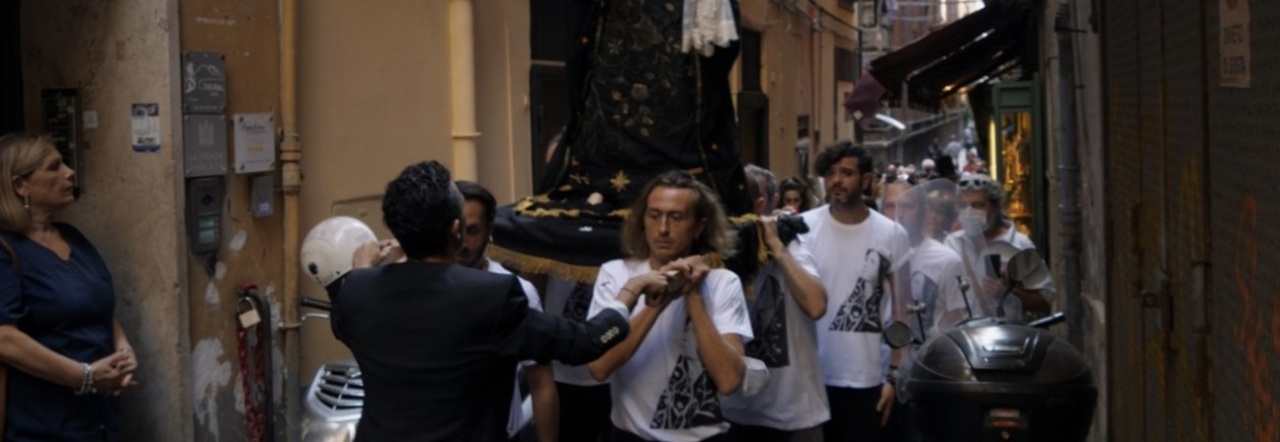Lands in Thessaloniki, at the 26th edition of the Thessaloniki Documentary Festival, the film by the Neapolitan by adoption director Caroline von der Tann.
“The Gospel according to Ciretta”, produced by Parallelo 41 and Lucky Bird Pictures, arrives at one of the main European events dedicated to real-life cinema bringing a story set in a devout and supportive Naples that deals with gentrification.
The international co-production, led by Antonella Di Nocera, lands in Greece on Friday, March 15. The work - starring Ciro Granada, Giuseppina Andelora, Angelo Picone, and Angelo Giordano - was made with the contribution of the Campania Region and the Film Commission of the Campania Region.
The protagonist of the work is Ciretta, a young man immersed in a world of religion, fantasy, and invention. He adores the Madonna Addolorata despite his past of prostitution and a very creative relationship with the truth. He shares the makeshift home, a theater temporarily closed in the historic center of Naples, with Angelo Giordano, an elderly homeless man. Supporting him are Perzechella and Capitano, a couple of social and cultural animators who during the Covid-19 lockdown helped the poor and homeless with a “panaro” lowered from the balcony.
Ciretta, endowed with an exceptional voice and extraordinary talent, organizes a large procession for his beloved Madonna and raises funds by selling lighters and singing and performing in the streets. The desire is to commission life-size statues of the Madonna and the dead Christ from renowned artisans. Then the devastating news: the theater-house has been sold and the new owner wants to turn it into yet another B&B in the historic center of Naples. Awaiting eviction, Ciretta’s main concern is where his Madonna will go. In the heart of Naples, a double battle is born: on one hand, the eviction of Ciretta and Angelo, on the other, a city that deals with unbridled tourism and real estate speculation.
“The ancient Mediterranean city of Naples currently arouses interest all over the world, being the setting for a series of highly successful blockbusters in cinema and literature. Part paradise, part hell, attractive and repulsive at the same time, it is the ideal stage for the human drama that unfolds daily. Among the backstreets and the bassi of the historic center of the city, indeed, carefully constructed cinematic moments play with light and shadow, the divine and the profane. Presented as a mystical fairy tale set between reality and imagination, the story follows a conscious decision to avoid the cliché-image of Naples as the capital of Gomorrah. Even though this reality obviously exists, it has become too predominant in the narrative of Naples, neglecting its immense poetic and cultural quality,” from the director’s notes.
“Another story from the belly of the real Naples dotted with characters and vibrations that give space to non-standardized visions of the city always in search of those complex contents, not easily frameable, even if most of the time its representation goes in this direction. Our films - from Corde in 2009 through Il Segreto and Le Cose belle to La giunta - try to return this narrative made of looks. With this film, we welcomed that of Caroline, Bavarian and always fascinated by Naples,” thus Antonella Di Nocera, producer of the work.
Caroline von der Tann, a graduate in Soviet Studies at the London School of Economics, is an author and director and lives between Munich and Naples. She deals with biographical narrative, history, religion, and political reporting. She started as a freelance journalist and documentary director working for various production companies and public and private televisions. She was an editor at the private German television channel Sat.1 where she participated in the development and supervision of various television series and comedy programs, and later at the public Austrian television channel ORF. In 2012 she took a sabbatical year and experimented with various creative forms such as writing, cinematography, and painting. Later she decided to return to her original passion: directing documentary films.

